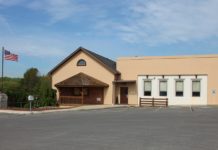During the Northampton School Board meeting on Monday, Sept. 9, directors considered six new and revised policies for adoption.
Revised Policy 218 – Student Discipline, which alters some of the language used and defines graffiti, was approved unanimously.
Revised Policy 218.1 – Weapons, which updates language that includes banning the possession of weapons and replicas of weapons in district buildings, on school property, on property being used by the school, at any school function or activity, at any school event held away from the school, onto any public vehicle providing transportation to school or a school-sponsored activity and while a student is coming to or from school, was passed 5-4 with Directors Kim Bretzik, Doug Vaughn, John Becker, Ross Makary and Michael Baird voting yes and Directors Josh Harris, Kristin Soldridge, Brian McCulloch and Nathan Lichtenwalner voting against the motion.
Harris explained that he was against the motion because the language allows many things to be considered weapons, whereas students that have jobs that require box cutters should not be punished for accidentally carrying one to school on them if they are coming to or from work.
Superintendent Joseph Kovalchik divulged that the district does threat assessments and will consider the circumstances, so that the student may be reprimanded but would not be expelled for an incident such as the one Harris described. Kovalchik also shared that he has the authority to recommend an expulsion or to not, and if an expulsion would take place, there would be a hearing, which would come before the board.
Becker opined that he would rather the policy be overprotective because it is the district’s responsibility to make sure children are safe.
Policy 218.2 – Terroristic Threats, which was revised to include that the board may require students that have been expelled for making terroristic threats provide competent and credible evidence from a behavioral service provider stating that the student does not pose a risk of harm to others prior to readmission, was approved unanimously.
Policy 810 – Transportation, which was revised to include additional information and sections on organization, maximum time on a bus, capacity of buses, non-assigned bus riders, bus routes, criteria for establishment of stops, school bus schedules, changes in bus stops or bus runs, transportation change requests, school bus discipline, school closings, student safety, bus passes, qualification for drivers, responsibilities of drivers and transportation to Bethlehem Area Vocational Technical School, was also unanimously approved.
Policy 903 – Public Participation in Board Meetings, failed in a 5-4 vote, with Bretzik, Harris, Lichtenwalner, McCulloch and Soldridge voting against the policy.
Policy 903’s revisions included the following: allowing public comments to be four minutes instead of three; permitting the interruption or termination of an individual’s public comment when it is in clear violation of the law or board policy for sexual harassment, racial, ethnic, religious or nationality intimidation, disclosure of confidential personal information regarding students or staff, speech that traditionally has not been protected under the First Amendment and speech that constitutes true threats such as inciting imminent lawless action or subjecting individuals to fear of violence; and that the presiding officer has the authority to interrupt an individual to warn them that their statement is too lengthy or that conduct is in violation of the policy, terminate the individual’s opportunity to comment when the conduct continues and is in violation of the policy after warning, call a recess or adjourn to another time when an individual’s conduct is disrupting the operation of the meeting, request an individual to leave when their conduct is disrupting the operation of the meeting, request the assistance of school security personnel or law enforcement to remove the disorderly person to enable the board to proceed with the orderly operation of the meeting if the individual refuses to leave the meeting and waive the board’s rules regarding public comment with the approval of a majority of those present and voting; and the presiding officer’s ruling regarding public comment may be overruled by a majority of those school directors present and voting if disputed.
Bretzik voiced that she found the language used in the revision prohibitively subjective and felt it could be used against citizens.
Finally, Policy 906 – Public Complaint Procedures, also failed in a 5-4 vote with Bretzik, Harris, Lichtenwalner, McCulloch and Soldridge voting against the policy.
The purpose of Policy 906 outlined the establishment of procedures for seeking appropriate resolution to complaints, which included three levels of procedure if complaints are not resolved through informal discussion. The first level required complainants to submit a written complaint to the building principal/designee and a conference would be scheduled, the second level permitted the superintendent/designee to review the complaint, schedule a conference and provide a written response to the complainant if a satisfactory resolution was not achieved through conference with the building principal/designee and the third level permitted the board to take action if a satisfactory resolution was not achieved through referral to the superintendent/designee or if the complaint was beyond the superintendent/designee’s authority and required board action. The board would then provide a written response within 30 days and could grant a hearing if necessary.
The policy also stated that all requests, suggestions and complaints that are first directed to individual board members or the board shall be referred to the superintendent for consideration, investigation and action, and shall be acted upon according to the level of procedures.
Bretzik expressed that she felt this policy was another layer of bureaucracy for the public to be able to submit complaints to the district since the superintendent has been doing a good job of navigating these complaints, and in doing so, has limited public frustration with the process.
In other news, the 2025 general obligation bonds in the approximate amount of $31,020,000 for the second phase of financing the new Route 329 elementary school and education center project, as well as the general obligation bonds refunding opportunity for refunding the outstanding 2019 and 2020 general obligation bonds with a minimum net savings target of $361,500, were both approved by the board, although McCulloch voted against both motions and Harris voted against the first.
Later, the board unanimously approved the naming of the new elementary school and education center being built on Route 329 and New Seemsville Road, which will be East Allen Elementary School. The project is on schedule to be completed by the 2026-27 school year.
Additionally, the board unanimously approved the creation of a rifle team at the high school at a cost not to exceed $34,000 after a discussion regarding its funding was had.
Harris voiced concerns about upcoming capital projects and expenses since the grant that was applied for will not be approved or denied until spring.
Due to the exceeding costs of the team, Kovalchik suggested the rifle team form a booster club to pay for some of the expenses since the costs associated with the team will be taken out of the reserve budget funds due to the team not being on the approved budget for the year.
The next Northampton School Board meeting will be held on Monday, Oct. 14 at 6:30 p.m. in the Northampton Area High School auditorium, located at 1619 Laubach Ave.








